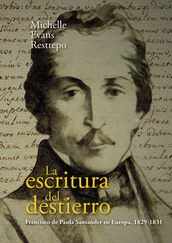
LIKE A “GIFT OF THE NIGHT” is how, in his diary, Nicholas Portulinus describes the boy from Anapoima who came asking for piano lessons from the great musician of Germany and Sasaima, the apparition who, with hands still soft but already skilled, played “The Greedy Cat” for the Maestro with a professionalism that seemed at odds with his long golden girl’s hair, with his voice that oscillated between the high peaks of childhood and the valleys of a deepness that was already gaining ground. In the presence of this unexpected guest, this lovely, talented boy who’d arrived from out of nowhere, as if he’d dropped from the sky or escaped from a dream, the great Maestro was left transfixed and utterly vulnerable, like someone who’d just witnessed a miracle. But unlike the fighters in the Greek ruins, the cherished spawn of delirium, the young performer of “The Greedy Cat” was real, real as could be, most definitely of flesh and blood, almost cruelly beautiful, childlike, overflowing with talent. It was as if this Farax were invented by Nicholas in one of his reveries, but Farax isn’t wounded like the marble youths, he’s not bleeding from any wound, he’s surprisingly alive and healthy, and he can be touched, or he could be touched, or one would like to touch him; one can see how much Nicholas would like to touch him, and in fact he dares to touch his shoulder, or if it’s too much to say touches, if the verb must be qualified, he scarcely brushes his shoulder the day everything begins.
And now Blanca appears onstage, with Nicholas dragging her by the hand, to behold the prodigy with her own eyes. Come, Blanca my dear, Nicholas has told her, you’re going to hear music like nothing you’ve heard before, and Blanca comes, annoyed and disbelieving, inured long ago to surprises and worried about the ripples of delusion that again crease her husband’s forehead. Blanca seeks strength that she no longer possesses to tackle once again the tiring task of deflating Nicholas’s fantasies and reducing them to their proper proportions, and yet, as she confesses in her diary, when she sees the child sitting at the piano she’s overcome by a strange feeling, “Suddenly I felt that I’d been given back the capacity to forgive,” to forgive life its rigors and herself her mistakes, to forgive Nicholas his terrors and start over again. “If I had to explain the strange, deep-seated feeling that came over me when I saw and heard Abelito, whom Nicholas has called Farax from the beginning, I would have to say that he struck me as the living image of the Nicholas I knew years ago, when everything was still promise and possibility, with no hints of shadow,” in other words, when her husband was still the sturdy man recently arrived from Germany whose visions seemed merely a poetic touch and whose twisted nature had yet to reveal itself.
Suddenly, seeing this boy playing “The Greedy Cat” on the piano, Blanca has before her again an immaculate, unburdened, carefree Nicholas, and she reproaches herself for allowing the flutter of a pleasant but unfounded feeling that life is granting her a second chance. As for Farax, as soon as he sees the fine-featured woman with dreamy eyelashes and dark circles under her eyes coming into the parlor hand in hand with the Maestro, he has the feeling that his hands will be paralyzed by fear and he won’t be able to play his best, but this proves untrue; his hands respond with joy and confidence because Farax feels at home before this woman with the somber gaze, as if he is with his mother or his sister, as if he is with someone he could love, or maybe someone he already loves from the first instant.
To listen to the visitor, Nicholas and Blanca sit together holding hands, he all aquiver with expectation, barely perched on the edge of the sofa and smacking his lips as if he’s hungry and about to be served a great delicacy, she trying to do two things at once, watching the boy with one eye and following her husband’s gaze with the other. Farax, meanwhile, gives himself over to the rhythm of the dance, forgetting his distinguished audience, rocking on the stool to keep time and accompanying the melody with an unconscious crooning, sweet and innocent. When “The Greedy Cat” comes to an end, one of those famous sentences is spoken, of the sort that is seemingly simple but loaded with hidden meaning and that seals the destiny of the speaker as well as the recipient. You and I understand each other, Nicholas says to Farax, using the casual tú instead of the formal usted although they hardly know each other, although there is an age difference of almost twenty years, although one is the master and the other the apprentice. Farax doesn’t know how to react to this unexpected form of address, to the Maestro’s smoldering gaze, to the brush of the Maestro’s hand on his shoulder, but he understands that his life will change in the wake of this We understand each other that wafts past his ears like a damp breath. Could we hear something else? asks Blanca, moved, in a voice that isn’t quite hers, and Farax, as if understanding the transcendent nature of the moment, starts to play the Blue Danube waltz with all the requisite solemnity.
Beyond the euphoria revealed in Nicholas’s and Blanca’s respective diary entries, one might ask whether this was really the “sweetest of sweet” instants that Blanca describes, and if it was, was it so for all three of them? for two of them? did anyone have a foreboding of pain and future shadows? During that first meeting, which of them was jealous, and of whom? What did Nicholas see in this Abelito to whom he gave the name Farax: a promising disciple? a rival in the trade? a rival in love? an object of desire? did he see his heir, the continuer of his art and in a certain way also of his life? or rather did he see in him the one who would trigger his ruin, the bringer of the silent news of his approaching end? In her diary, Blanca asks herself the question in broader terms when she speculates whether decisive moments are decisive from the instant they occur, or whether they only become decisive in light of what comes after them and what they bring about. Meanwhile, there’s no diary or letter to explain what Eugenia was doing in the big parlor that exuded dampness, what corner she’d been relegated to when her father, her mother, and Farax all forgot her, leaving her alone with the lead soldiers lined up in marching order.
Farax came from far away and to judge by the modesty of his clothes and the battered state of his knapsack, it seemed unlikely, even impossible, that he would have money to pay for room and board in town, so the Portulinuses invited him to dine with them that night and to sleep there if he so desired, and in fact he did so desire, not just that night but all the following nights for the next eleven months. If only silence were white! Nicholas shouted at dawn the first time Farax spent the night with them, If only silence weren’t so damnably filthy and tainted, he said with a sigh, bursting into his wife, Blanca’s, bedroom and waking her up. What are you talking about? she asked, sitting up in bed and struggling to see where such a thorny topic would take them at this hour of the night. I’m saying, Blanca, that I wish silence wasn’t polluted. Polluted how, she asked just to gain time, at least enough to put on her robe. With noise, with noise, what else? can’t you hear it? the silence is riddled with sounds that hide in it like creaks in the joists, and that eat away at it from within; you’d have to be deaf not to hear the humming and buzzing, or are you still asleep and that’s why you can’t understand me? Nicholas shook her, grasping her by the trim of her nightdress, while she begged him to lower his voice so he wouldn’t frighten the children and the visitor, and at the same time tried surreptitiously to find the drops for the tinnitus, or chronic ringing, that her husband suffered from in both ears. To compose I need pure silence, Blanca, the way poets need blank pages, or do you think Lord Byron could have written anything worthwhile on a sheet that was already full of words; and seeing that his wife was deathly pale from being shaken he let go of her and smoothed her crumpled nightdress and disheveled hair. It’s all right, Blanquita my dear, it’s all right, he said, sitting down beside her, it’s all right, nothing’s the matter, don’t look so frightened, I just want you to understand that despite what people think, silence isn’t beneficial or restful.
Читать дальше













